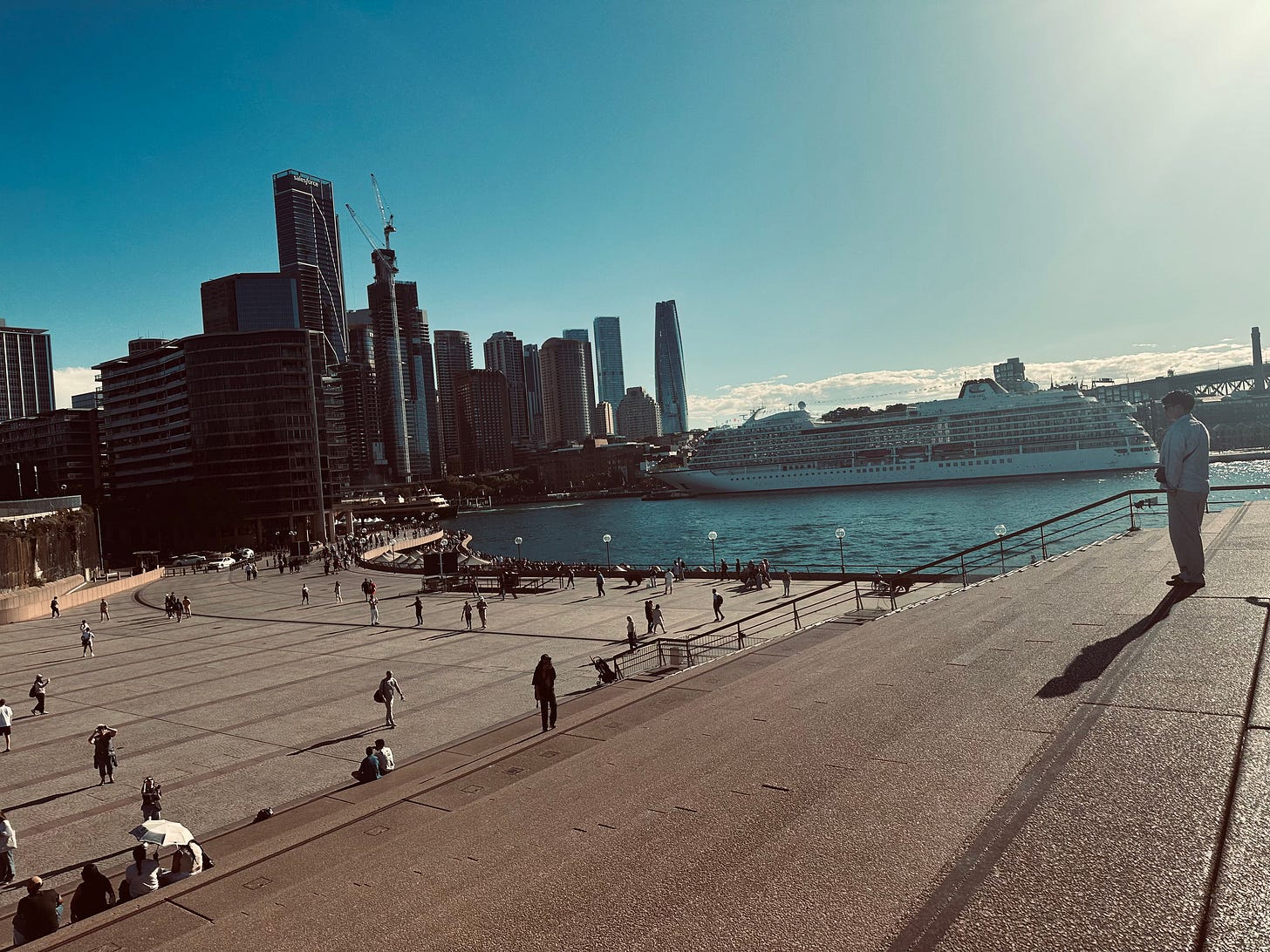Digital Nomad vs. "Regular" Traveler
Near the end of my first digital nomad journey, I reflect on the differences between being a digital nomad and engaging in "regular" travel.
With only a few days left in my digital nomad journey — I fly direct (16-hour-long) from Auckland, NZ to NYC (JFK) on the 31st — I pondered what I would write about for my fourth post. I considered detailing my vegan food adventures, but because I slacked in that aspect (especially when it came to taking pictures of food) and didn’t log my food as I might for a so-called “normal” travel adventure, I decided to shift my focus here to what it’s like being a digital nomad vs. being a “regular” traveler. A special thank you to everyone reading my blog; I appreciate your views, shares, etc. (And it’s not too late to subscribe!)
A typical instance of traveling is more in line with going on vacation; you take a couple of weeks — or more if you’re fortunate — off from work, or maybe you’re retired (like my parents), so can take longer trips. The last time I did a more standard type of vacation (or “holiday,” as they call it in places like Australia and New Zealand) was more than a year ago, when I visited Madeira, Portugal for less than a week while my parents rented a villa there for a month. And how was that for me? Perfectly fine. However, I was not a fan of the cruise ships and hoards of tourists coming through the area, and I also haven’t liked the immense crowds that have frequented places in this journey such as Sydney and Auckland (where I am now).
What is a Digital Nomad?
If you’re reading this post and still don’t know what a digital nomad is, I will explain…well, I don’t think I need to because it’s in the wording. “Digital” implies doing things online — in this case, working or looking for work — and “nomad” implies moving to different places every couple of days, weeks, and months, depending on how much you’d like to country- or city-hop. Unlike expats or immigrants, who move to specific countries for longer periods (sometimes permanently), digital nomads may not have a particular location picked out for long-term or permanent residence. This enables us to explore more of this wonderful world while perhaps also doing a sort of “scouting trip,” which is when you travel to different places to determine where you’d like to live. However, people like myself aren’t always aiming to move abroad permanently (though this is certainly an option and a possibility), and will probably, like yours truly, have a home base in their country of residence in between digital nomad trips.
In my case, “home base” is Westerly, Rhode Island, USA. I’m fortunate that my situation enables me to travel for months at a time while my parents care for my dog, Zuzu (who I miss dearly!), and then I will house sit while they travel. There are plenty of others living as full-time digital nomads, without a home base, which is always an option, but for now, I like having my cozy bedroom, shower, and panini maker (I miss that more than you’d expect!).

So, how can digital nomads afford to travel that much? Well, you don’t need to be rich to do so, because I’m certainly not. Most cities will accept all major credit cards, and because I have the Capital One Venture X card — an upgrade from my Venture 1 — I get extra points on travel-related purchases, and these points can be used to help pay off those purchases. However, I could realistically save my points to obtain a free flight, so I’m being conservative with spending my points.
Most digital nomads will, in fact, work (or at least be seeking work, as is my case) while traveling, which obviously helps pay for food, accommodation (unless using TrustedHousesitters), flights, public transportation, Uber and Lyft, etc. This may sound like a lot, but if you think about it, your typical expenses in your home country — especially if it’s the U.S. — would most likely be lower, unless you’re going to a place with a relatively high cost of living, like Singapore or Switzerland. Being a digital nomad could actually SAVE YOU MONEY. Yes, you heard that right: working while traveling, staying in inexpensive (or free) accommodations, and spending less money on food and other expenses could save you money in the long run.
Why Digital Nomad-ing > “Regular” Traveling

(Yes, I know I made digital nomad into a gerund, so please forgive me, grammar gods). As this blog is focused on positivity — because we have enough negativity around us — I’ll explain why I prefer being a digital nomad to being a “regular” traveler. Of course, traveling on vacation or holiday has its benefits, yet it’s easy to recognize the advantages of traveling more slowly. I like the term “slomad,” referring to a digital nomad who opts for slower travel, as opposed to moving every few days or weeks. (And no, I did not invent that term, so don’t give me credit for that).
#1. You can experience life like a local
When you’re on vacation, you typically stay at hotels, resorts, etc. and engage in touristy activities, visiting common attractions, and experiencing the local culture from somewhat of a distance. This makes it difficult to comprehend what it’s like to truly live there, even if you’re at an Airbnb or actively seeking out “off the beaten path” experiences. As such, you may miss out on the most unique aspects of your location. This is even more likely when you’re visiting numerous cities, towns, and destinations. While you may be getting the “most bang for your buck,” quantity doesn’t equal quality.
One of many things I loved about volunteering at Monkey Helpline, a vegan sanctuary near Durban, South Africa, in the fall of 2023 was getting to know the South Africans who run the organization and becoming familiar with South African culture. The same could be said for my time in Wagga Wagga, especially compared to a big city like Sydney, as in that small town in NSW, people were likely to assume I was a local…until they heard my American accent. This kind of travel also enables you to see if you’d like living there, were you to consider moving abroad, as it’s not uncommon for digital nomads to eventually become expats and even immigrants.
#2. You have more time to relax & appreciate your surroundings

On a related note, traveling at a slower pace allows you to really relax and appreciate your surroundings. When you’re on a vacation where every minute detail is planned to a T, you may feel accomplished knowing that things are (seemingly) in order, but after all the excitement has worn off, you will undoubtedly be exhausted. Maybe you wish you’d stayed longer in a particular location to appreciate it more, such as when you’re in an outdoor setting and the weather hasn’t cooperated, but you only have one chance to see that attraction. When I was in Sydney the first time, it rained quite a bit, but I knew I’d be back at the end of my time in Australia, so I wasn’t devastated by missing out on certain things at the beginning. Remember the wise words of Forrest Bueller: “If you don’t stop and look around once in a while, you could miss it.”
#3. You can make more meaningful connections

While this does not apply to me specifically, especially on this trip in particular, it’s easy to see how spending weeks and months in certain locations and living more like a local can make it easier to make more meaningful connections. Of course, as a neurodivergent individual, this isn’t easy for me, and I don’t go places actively seeking to make friends. When walking around town or in the city, I may smile at people or occasionally say hello (the latter is likelier in a small town), but I often mind my own business. I’m friendly to everyone I meet, yet I’m not looking for friendships.
But enough about me. (Although, in the future, I’d like to explore such things as co-working spaces and other digital nomad hubs to meet more people). As opposed to the few people you may meet on a regular vacation or trip — although, if you’re in a tour group, you may become close with those people — you’ll likely see a lot of the same people when you stay in a location for a while. For example, if you often see a fellow remote worker at the local coffee shop, then maybe you want to strike up a conversation with them someday. I’m not saying I would necessarily do that, but extroverts and people who are even more outgoing than I would excel in that situation. And who knows? You may make a lifelong friend…or even a romantic partner! (Hmm, maybe now I should consider being more social).
#4. You can avoid the crowds
While avoiding crowded areas is essentially unavoidable, especially in a city like Sydney or Auckland, as a digital nomad you are unlikely to encounter the kinds of crowds and tourist-heavy settings in which you’d typically find yourself as a regular traveler. Of course, nothing is stopping you from being a tourist when you’re in a new location. Even as someone who prefers to avoid popular attractions as much as possible, I gravitated towards popular locations like Honolu’s Waikiki Beach and Sydney’s Royal Opera House. But I’m not someone who reads travel guidebooks or checks Viator or other websites to see what other tourists prefer. I don’t care what “other tourists” prefer to do, because I’m not a tourist.

Instead, I’ll find myself wandering into small cafes, restaurants, bookstores, movie theatres, hair salons, etc., and I like that. There’s something fun and relaxing about not having a set plan for every single day I’m in a location. It may sound intimidating, but wandering on foot in a brand-new setting is exciting and eye-opening, even if it doesn’t seem like it at the time. Avoiding crowds has helped me feel way less stressed and I'll probably be more stressed when I return to the U.S. (probably due to what’s going on politically, but that’s irrelevant here).
There are surely more reasons than I have listed here, but those are just the ones off the top of my petite head. Thank you for following my first digital nomad journey, and there will most likely be more to come.








This is great! Any advice on TrustedHousesitters or finding win-win housing accommodations in general via (in)formal networks?